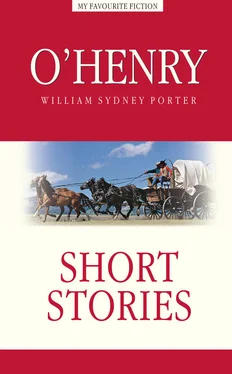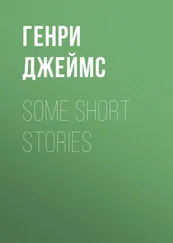Monsieur Bril bored to the last page of the poems. Then he took off his spectacles, and wiped them with his handkerchief.
“My old friend, Papineau, is well?” he asked.
“In the best of health,” said David.
“How many sheep have you, Monsieur Mignot?”
“Three hundred and nine, when I counted them yesterday. The flock has had ill fortune. To that number it has decreased from eight hundred and fifty.”
“You have a wife and home, and lived in comfort. The sheep brought you plenty. You went into the fields with them and lived in the keen air and ate the sweet bread of contentment. You had but to be vigilant and recline there upon nature’s breast, listening to the whistle of the blackbirds in the grove. Am I right thus far?”
“It was so,” said David.
“I have read all your verses,” continued Monsieur Bril, his eyes wandering about his sea of books as if he conned the horizon for a sail. “Look yonder, through that window, Monsieur Mignot; tell me what you see in that tree.”
“I see a crow,” said David, looking.
“There is a bird,” said Monsieur Bril, “that shall assist me where I am disposed to shirk a duty. You know that bird, Monsieur Mignot; he is the philosopher of the air. He is happy through submission to his lot. None so merry or full-crawed as he with his whimsical eye and rollicking step. The fields yield him what he desires. He never grieves that his plumage is not gay, like the oriole’s. And you have heard, Monsieur Mignot, the notes that nature has given him? Is the nightingale any happier, do you think?”
David rose to his feet. The crow cawed harshly from his tree.
“I thank you, Monsieur Bril,” he said, slowly. “There was not, then, one nightingale among all those croaks?”
“I could not have missed it,” said Monsieur Bril, with a sigh. “I read every word. Live your poetry, man; do not try to write it any more.”
“I thank you,” said David, again. “And now I will be going back to my sheep.”
“If you would dine with me,” said the man of books, “and overlook the smart of it, I will give you reasons at length.”
“No,” said the poet, “I must be back in the fields cawing at my sheep.”
Back along the road to Vernoy he trudged with his poems under his arm. When he reached his village he turned into the shop of one Zeigler, a Jew out of Armenia, who sold anything that came to his hand.
“Friend,” said David, “wolves from the forest harass my sheep on the hills. I must purchase firearms to protect them. What have you?”
“A bad day, this, for me, friend Mignot,” said Zeigler, spreading his hands, “for I perceive that I must sell you a weapon that will not fetch a tenth of its value. Only last I week I bought from a peddlar a wagon full of goods that he procured at a sale by a commissionaire of the crown. The sale was of the chateau and belongings of a great lord – I know not his title – who has been banished for conspiracy against the king. There are some choice firearms in the lot. This pistol – oh, a weapon fit for a prince! – it shall be only forty francs to you, friend Mignot – if I lose ten by the sale. But perhaps an arquebuse – ”
“This will do,” said David, throwing the money on the counter. “Is it charged?”
“I will charge it,” said Zeigler. “And, for ten francs more, add a store of powder and ball.”
David laid his pistol under his coat and walked to his cottage. Yvonne was not there. Of late she had taken to gadding much among the neighbours. But a fire was glowing in the kitchen stove. David opened the door of it and thrust his poems in upon the coals. As they blazed up they made a singing, harsh sound in the flue.
“The song of the crow!” said the poet.
He went up to his attic room and closed the door. So quiet was the village that a score of people heard the roar of the great pistol. They flocked thither, and up the stairs where the smoke, issuing, drew their notice.
The men laid the body of the poet upon his bed, awkwardly arranging it to conceal the torn plumage of the poor black crow. The women chattered in a luxury of zealous pity. Some of them ran to tell Yvonne.
M. Papineau, whose nose had brought him there among the first, picked up the weapon and ran his eye over its silver mountings with a mingled air of connoisseurship and grief.
“The arms,” he explained, aside, to the cure, “and crest of Monseigneur, the Marquis de Beaupertuys.”
He compelled my interest as he stepped from the ferry at Desbrosses Street. He had the air of being familiar with hemispheres and worlds, and of entering New York as the lord of a demesne who revisited it in after years of absence. But I thought that, with all his air, he had never before set foot on the slippery cobblestones of the City of Too Many Caliphs.
He wore loose clothes of a strange bluish drab colour, and a conservative, round Panama hat without the cock-a-loop indentations and cants with which Northern fanciers disfigure the tropic head-gear. Moreover, he was the homeliest man I have ever seen. His ugliness was less repellent than startling – arising from a sort of Lincolnian ruggedness and irregularity of feature that spellbound you with wonder and dismay. So may have looked afrites or the shapes metamorphosed from the vapour of the fisherman’s vase. As he afterward told me, his name was Judson Tate; and he may as well be called so at once. He wore his green silk tie through a topaz ring; and he carried a cane made of the vertebrae of a shark.
Judson Tate accosted me with some large and casual inquiries about the city’s streets and hotels, in the manner of one who had but for the moment forgotten the trifling details. I could think of no reason for disparaging my own quiet hotel in the downtown district; so the mid-morning of the night found us already victualed and drinked (at my expense), and ready to be chaired and tobaccoed in a quiet corner of the lobby.
There was something on Judson Tate’s mind, and, such as it was, he tried to convey it to me. Already he had accepted me as his friend; and when I looked at his great, snuff-brown first-mate’s hand, with which he brought emphasis to his periods, within six inches of my nose, I wondered if, by any chance, he was as sudden in conceiving enmity against strangers.
When this man began to talk I perceived in him a certain power. His voice was a persuasive instrument, upon which he played with a somewhat specious but effective art. He did not try to make you forget his ugliness; he flaunted it in your face and made it part of the charm of his speech. Shutting your eyes, you would have trailed after this rat-catcher’s pipes at least to the walls of Hamelin. Beyond that you would have had to be more childish to follow. But let him play his own tune to the words set down, so that if all is too dull, the art of music may bear the blame.
“Women,” said Judson Tate, “are mysterious creatures.”
My spirits sank. I was not there to listen to such a world-old hypothesis – to such a time-worn, long-ago-refuted, bald, feeble, illogical, vicious, patent sophistry – to an ancient, baseless, wearisome, ragged, unfounded, insidious, falsehood originated by women themselves, and by them insinuated, foisted, thrust, spread, and ingeniously promulgated into the ears of mankind by underhanded, secret and deceptive methods, for the purpose of augmenting, furthering, and reinforcing their own charms and designs.
“Oh, I don’t know!” said I, vernacularly.
“Have you ever heard of Oratama?” he asked.
“Possibly,” I answered. “I seem to recall a toe dancer – or a suburban addition – or was it a perfume? – of some such name.”
“It is a town,” said Judson Tate, “on the coast of a foreign country of which you know nothing and could understand less. It is a country governed by a dictator and controlled by revolutions and insubordination. It was there that a great life-drama was played, with Judson Tate, the homeliest man in America, and Fergus McMahan, the handsomest adventurer in history or fiction, and Senorita Anabela Zamora, the beautiful daughter of the alcalde of Oratama, as chief actors. And, another thing – nowhere else on the globe except in the department of Treinta y tres in Uruguay does the chuchula plant grow. The products of the country I speak of are valuable woods, dyestuffs, gold, rubber, ivory, and cocoa.”
Читать дальше
Конец ознакомительного отрывка
Купить книгу












